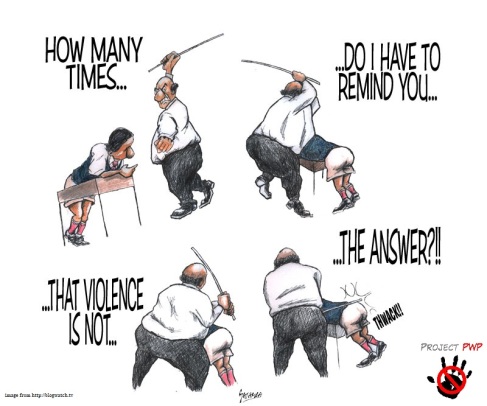Some would say they were spanked as a child but they turned out okay. But there are really no studies that support corporal punishment has beneficial effects in the long-term development of a child. In fact, it is proven by numerous studies and reports written by child experts, psychologists, doctors, and scientists that it has its negative effects on children.
Escalation
Most parents use a slight swat on the hand or on a child’s backside (as is most common in the Philippines) thinking it does nothing compared to actually beating a child. However this seemingly innocent disciplining act can actually be the beginnings of seriously hurting a child. Although inflicting pain can initially produce immediate result in correcting an undesired behavior, a child eventually learns to adapt to it and its effectiveness may decrease overtime. Chances are to produce the same immediate result, a parent or a disciplining adult will increase the intensity of the punishment which may lead to abuse. Also most parents hurt their child out of emotional impulse like when they are angry or scared (when their child suddenly crosses a busy intersection). In such situations, parents might lose control and may cause serious injuries to their child.
Encouraging Violence
Most parents feel that children, especially toddlers will only respond to pain as it is the only language they can understand. Some establish their authority through fear by shouting, threatening or scaring their children because such actions are believed to produce instant results. They believed that a swat or the threat of being spanked or punished will definitely and immediately make a child stop doing something unacceptable or remember not to do it again. But what most parents fail to understand is the long-term effects of these actions.. Using fear and violence in teaching a child will only make them believe and adopt your disciplining method in the future as their own means of solving problems or getting out of sticky situations. This negative effect is what may jumpstart the vicious cycle of a child being hit, which may become aggressive with and among his siblings, which may become a bully in school, or will take part in aggressively anti-social behaviors during adolescence, and in turn grow-up to be violent towards their partners and in eventually with their own children.
Psychological Damage
Another long-term effect of corporal punishment is emotional harm on children. Some parents who although say that they do not physically hurt their kids, but instead use forms of punishment like humiliating or degrading, name-calling, shouting at them in front of others or isolating when they do something wrong. These acts often cause relationship barriers between the child and their parents, damaging the emotional link and communication and instead results fear and resentment.
Non-physical forms of punishment also often lead to low-self-esteem and depression,.. In the Philippines, common phrases such as Pinalo kita kasi mahal kita. (I hit you because I love you), or Ginawa ko yun, para sa kabutihan mo, para matuto ka. (I did that for your sake, so that you will learn) are widely known and used, but research says that such messages confuses love with pain, and anger with submission.
Furthermore, the use of corporal punishment may also disrupt the learning process of a child, interfering with their sensory and emotional development. A sociologist’s study has even found out that the more a child is spanked, the lower their IQ’s.
Sources:
http://www.nospank.net/johnson2.htm
http://www.time.com/time/magazine/article/0,9171,1191825-2,00.html
http://www.unicef.org/lac/spbarbados/Implementation/CP/Global/Educate_donthit_SaveManual.pdf
http://www.unicef.org/violencestudy/pdf/Hitting-wrong.pdf
Larzelere RE. A review of the outcomes of parental use of nonabusive or customary physical punishment. Pediatrics. 1996:824–828

